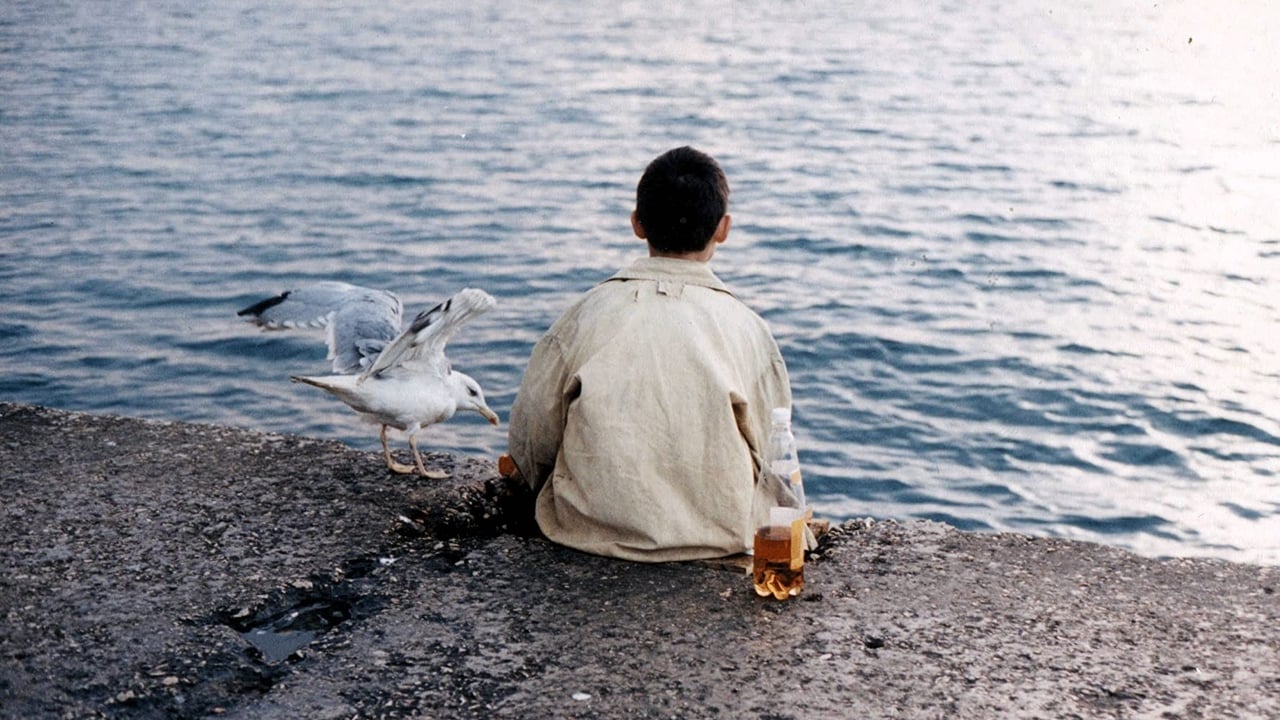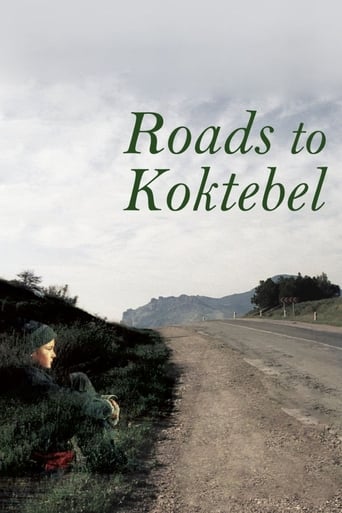Incannerax
What a waste of my time!!!
Teringer
An Exercise In Nonsense
WillSushyMedia
This movie was so-so. It had it's moments, but wasn't the greatest.
Sameer Callahan
It really made me laugh, but for some moments I was tearing up because I could relate so much.
Robert Broadie
Koktabel follows the progress of a penniless father and son from some undefined point in Russia to a Black-Sea resort in the Crimea. From my point of view, the story and its characters are primarily vehicles for the stunning images, which ultimately steal the show. But that's not to take anything away from a well-acted story with some very tense and some very funny moments.Here are a few of the most memorable pictures which stayed with me long after watching the film: 1) A red and white parasol on an empty pebble beach at night, twitching like a living thing, waves breaking, perfectly black water; 2) A close-up of a girl's hair roots, a cash register and a cashier's voice audible from beyond; 3) A solitary wooden toilet shack outside a wood with a cheap stereo hanging from a neighbouring tree branch, little red lights on the speakers flashing like eyes – as the camera approaches, the music gets louder; 4) Objects flashing into view for split seconds between stretches of darkness, as seen through the lens of an old camera.Between the geometric shapes of the opening and closing shots (a tunnel in a hill and a bird's-eye view of a landing pier respectively), almost every scene provides an earthy, harmonious, visual gem, each worthy of admiration in its own right.The clearest recurring theme in the film is flying. One of the first lines is the father's weary joke "we'll go by plane" (wrongly subtitled as "we'll fly") – he's a former plane engineer. Fed on his talk of butterflies and birds and hang-gliders, his son has his own dreams of flight, which recur as an albatross in an illustrated book, as rusty sheets of metal gliding from a roof, as sheets of paper being launched from a hilltop (the motionless camera leaves us to wonder how far the last one does actually fly), with the boy's gift of being able to visualise a landscape from a great height (filmmakers can have poetic licence too), and with the film's closing bird's-eye shot. To me this flying metaphor can be extended beyond it's obvious application to the boy (living in poverty but abounding in curiosity, imagination, and daydreams), to the lowly cast of the film, left behind by the new Russia (and Ukraine), and to the economic backwaters they live in. Whether or not the characters themselves dream of flying, the filmmaker, dwelling lovingly on the things that surround them (apple trees, a storm, a washing line) elevates them to a work of art, and does their dreaming for them.I couldn't fail to deeply admire this film, but I don't expect anyone to share my very personal take on it – in its measured, pensive, quiet voice, Koktabel shows us the former USSR from an angle which brings out those same qualities that impressed me in my first experiences of the place. Not the glitz and kitsch and squalour of its largest cities, but its vast expanses (expressed in the film through fields, roads, and rail tracks), the uniqueness of Russian minutiae (a soviet-manufactured metal tub, an old-fashioned box of cigarettes, standard cheap wallpaper and clock in a house, the bustle in a tourist market), and above all, vibrancy amidst decay.
gospodinBezkrai
One should be in a relaxed mood when going to see this film. Be there to tranquilly cherish the moments of life and the film will open itself and offer you all its hidden prizes.Someone mentioned the landscapes are bleak... The film is isomorphic to its landscapes. Bleak and lovely at the same time. Little bit depressing for those who choose to stay at a distance, to look at (film or landscapes) as at exhibits. For those who step in, it becomes precious in its touching ugliness. As you enter, ugliness is redefined. We are able to adore and love what we thought ugly before when we lived in the world bombarded by artificially selected beauty. We appreciate the naturality, the simple yet awkward reality of landscapes, of characters and of situations. The directing and actors are both excellent and succeed to achieve this reality so difficult to balance on screen!There isn't more talk than necessary, more expression of emotions or velocity of thought than a real living person would allow - not any of the tricks directors have to use to keep us interested. Yet the film is not boring. Because we can feel and understand the characters on screen as fully as we can a human being next to us! We can recognize little parts from the happening in the memories of our own life. Memories otherwise we'd never pay attention to.
writers_reign
This is doing the Russian Tourist Board no favors at all, portraying as it does a seemingly endless drab landscape punctuated by decaying buildings both domestic and commercial and populated by equally drab eccentrics. To call it slow-paced would be to call sloths sprinters but that is not necessarily a deficit. 90 per cent of the shots begin as Extra Wide taking in all the colorless terrain and occasionally introducing movement via people and, even more occasionally, traffic. Although shot in color the landscape remains resolutely grey. There's also a penchant for holding a shot for long moments after the characters have exited and in this it resembles Goodbye, Dragon Inn. Nevertheless we find ourselves watching the father and son as they make their very slow way to the Crimea having, we are told, started from Moscow. Along the way we learn, or discover, that the father is a recovering alcoholic and that the Koktebel to which he is taking his son no longer exists, at least not under that name, a metaphor for lives that must change or disappear. The film has to be carried by the two principals but there is decent support from a railway worker, a teenage girl, a householder and a doctor with no patients. It's not going to make a fortune but films like this deserve to be seen as a counterpoint to the formulaic.
LE020
Good cinematography will only take you so far. However, amazing cinematography will carry your film by itself. And that's just the start...Acting is well above average, and the writing, although somewhat resembling the "Russian soul" in its mystique and lack of structure, nevertheless fulfills its duty: to get to the hearts of those who for some unknown reason would not find themselves enchanted by the visuals alone...

